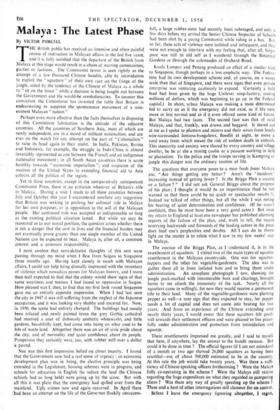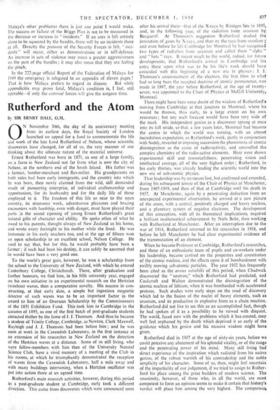Malaya : The Latest Phase
By VICTOR PURCELL
THE British public has received an intensive and often painful course of instruction in Malayan affairs in the last five years,
and it is fully satisfied that the departure of the British from Malaya at this stage would result in a chaos of warring communities, parties or factions. The Communist terror is seen rightly as the attempt of a few thousand Chinese bandits, able by intimidation to exploit the " squatters " of their own race on the fringe of the jungle, aided by the tendency of the Chinese of Malaya as a whole to " sit on the fence " while a• decision is being fought out between the Government and the would-be revolutionaries. To counter this conviction the Cominform has invented the fable that Britain is endeavouring to suppress the spontaneous movement of a non- existent Malayan " nation."
Perhaps even more effective than the facts themselves in disposing of this Cominform fabrication is the attitude of the adjacent countries. All the countries of Southern Asia, most of which are newly independent, are in a mood of militant nationalism, and are ever on the watch for any attempt on the part of " Colonialism " to raise its head again in their midst In India, Pakistan, Burma and Indonesia, for example, the struggle in Indo-China is almost invariably represented as one between the French and an indigenous nationalist movement ; in all South Asian countries there is acute hostility towards "economic imperialism "; and suspicion of the motives of the United States in extending financial aid to Asia colours all the politics of the region.
Yet in these countries, except in the comparatively unimportant Communist Press, there is no criticism whatever of Britain's role in Malaya. During a visit I made to all these countries between July and October this year I encountered nowhere any suggestion that Britain was seeking to prolong her colonial rule in Malaya for her own purposes,•or in opposition to the will of the Malayan people. Her continued rule was accepted as indispensable so long as the existing political situation lasted. But while we may be reassured as to our moral position, the question arises whether there is not a danger that the cost in lives and the financial burden may not eventually prove greater than one single member of the United Nations can be expected to bear. Malaya is, after all, a common interest and a common responsibility.
I must confess that semi-defeatist thoughts of this sort were passing through my mind when I flew from Saigon to Singapore three months ago. Having kept closely in touch with Malayan affairs, I could not help being dismally impressed with the inventory of violence which nowadays passes for Malayan history, and I more than half expected to find that the colony would show signs of that same weariness and tension I had found so oppressive in Saigon. How pleased was I, then, to find that my first look round Singapore gave me an entirely opposite impression. When I had last seen the city in 1947 it was still suffering from the neglect of the Japanese occupation, and it was looking very shabby and uncared for. Now, in 1950, the scene had entirely changed. The buildings had mostly been refaced and newly painted (even the grey Gothic cathedral
..had received a coat of dubiously aesthetic whitewash), and little gardens, beautifully kept, had come into being on what used to be bits of waste land. Altogether there was an air of civic pride about the city, and of normality and quiet confidence about its people. Prosperous they certainly were, too, with rubber well over a dollar - a pound.
Nor was this first impression belied on closer inquiry. I found that the Government now had a real sense of urgency ; an economic development plan was in being, the elective principle was being 'extended in the Legislature, housing schemes were in progress, and schools for education in English (to reduce the lead the Chinese Schools had so long held) were going up by the score. But with all this it was plain that the emergency had spilled over from the -mainland. Ugly crimes now and again occurred. In April there JItad been an attempt .on the life of the Governor (luckily unsuccess-
ful), a large rubber-store had recently been sabotaged, and only a few days before my arrival the Senior Chinese Inspector of Schools had been shot by a young Communist while riding in a bus. But, so far, these acts of violence were isolated and infrequent, and they were not enough to interfere with my feeling that, after all, Singa- pore was still its old self as I wandered through the Botanical Gardens or through the colonnades of Orchard Road.
Kuala Lumpur and Penang produced an effect of a similar kind to Singapore, though perhaps in a less emphatic way. The Federa- tion had its own development scheme and, of course, on a vaster scale than that of Singapore, and there were signs that even private enterprise was venturing cautiously to expand. (Certainly a bold lead had been given by the huge Unilever soap-factory, costing millions of dollars, which was beginning to go up in the Federal capital.) In short, urban Malaya was making a most determined bid to carry on as if the emergency did not exist, as if life were more or less normal and as if it even offered some kind of future. But Malaya had two faces. The second face was that of rural Malaya, and that, frankly, was drawn and haggard. It stared out at me as I spoke to planters and miners and their wives from lonely wire-surrounded fortress-bungalows, floodlit at night, to move a yard away from which meant the risk of sudden death in ambush. This insecurity and anxiety were shared by every country and village dweller, be he or she a mining coolie or a peasant working in field or plantation. To the police and the troops serving in Kampong or jungle this danger was the ordinary routine of life.
The questions that everyone poses to a man fresh from Malaya are, " Are things getting any better ? Aren't the ' incidents' increasing instead of getting fewer ? Is the Briggs Plan a success or a failure ? " I did not ask General Briggs about the progress of his plan ; I thought it would be an impertinence (had he not warned us that there could be no quick or spectacular results ?). Instead we talked of other things, but all the while I was noting his bearing of quiet determination and confidence. (If he wasn't confident, then he must have been a very good actor.) But since my return to England at least one newspaper has published alarming reports of the failure of the plan, and, truth to tell, the recent scurrying backwards and forwards of the leading actors in the piece does feed one's perplexities and doubts. All I can do to throw light on the matter is to relate what I saw in my few weeks' stay in Malaya.
The essence of the Briggs Plan, as I understand it, is in the resettlement of squatters. I visited two of the main types of squatter resettlement in the Malayan countryside. One was for squatter- tappers and the other for vegetable-gardeners. The idea was to gather them all in from isolated huts and to bring them under administration. An aeroplane photograph I saw, showing the jungle pock-marked with innumerable huts and clearings, brought home to me afresh the immensity of the task. Nearly all the squatters came in willingly, for now they would receive a permanent title to their land. Many of the vegetable-gardeners were planting pepper as well—a sure sign that they expected to stay, for pepper needs a lot of capital and does not come into bearing for two years. And from an experience of the Chinese extending over nearly thirty years, I would swear That these squatters felt good- will towards their settlement officers and were pleased to live peace- fully under administration and protection from intimidation and squeeze.
These resettlements impressed me greatly, and I said to myself that here, if anywhere, lay the answer to the bandit menace. But could it be done in time ? The official figures (if I am not mistaken) of a month or two ago showed 26,000 squatters as having been resettled—out of about 500,000 estimated to be in the country. At this rate the job would take twenty years. Was there a suffi- ciency of Chinese-speaking officers forthcoming ? Were the Malays fully co-operating in the scheme ? Were the Malays still restive regarding the huge expenditure on what they regarded as pampering aliens ? Was there any way of greatly speeding up the scheme 7 These and a host bf other interrogations still clamour for an answer.
Before I leave the emergency (ignoring altogether, I regret, Malaya's other problems) there is just one point I would make. The success or failure of the Briggs Plan is not to be measured in the decrease or increase in " incidents." If an area is left entirely alone to be squeezed by the bandits, there will be no incidents there at all. Directly the pressure of the Security Forces is felt, inci- dents " will occur, either as demonstrations or in self-defence. An increase in acts of violence may mean a greater aggressiveness on the part of the bandits ; it may also mean that they are feeling the pinch.
In the 222-page official Report of the Federation of Malaya for 1949 the emergency is relegated to an appendix of eleven pages !
That is how Malaya prefers to regard its disease. But while appendicitis may prove fatal, Malaya's condition is, I feel, still operable—if only the external forces will give the surgeon time.







































 Previous page
Previous page